GCSE results 2021: The lowdown on the exams in NI
- Published
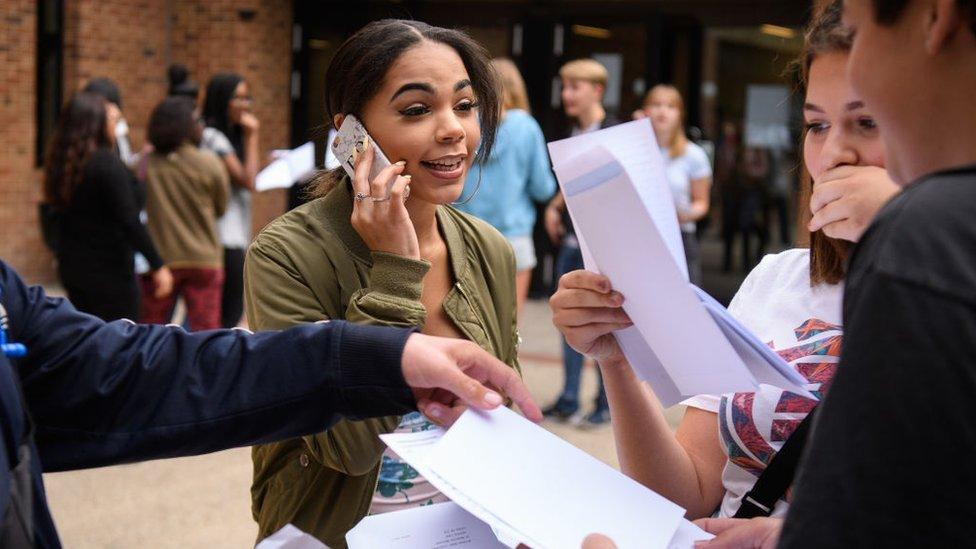
Many pupils will go to their school to pick up results as unlike A-levels, they cannot receive them online
Thursday is the big day for thousands of GCSE students across Northern Ireland.
Earlier in the week, A-level, AS-level and some BTec results were published.
Pupils did not sit GCSE exams for the second year in a row due to the Covid-19 pandemic.
This year, teachers will use their professional judgement to award grades.
Who is getting their results?
There are 29,000 GCSE candidates this year.
GCSE stands for General Certificate of Secondary Education and they are taken mainly by 15 and 16-year-olds.
GCSEs are available in more than 60 subjects and vocational areas.
Pupils use their GCSE results to progress to A-level, courses in Further Education, training or employment.
Many pupils will go to their school to pick up results as unlike A-levels, they cannot receive them online.
How will teachers decide grades?
They will look for evidence of work completed in each subject, carry out an assessment and give an appropriate grade.
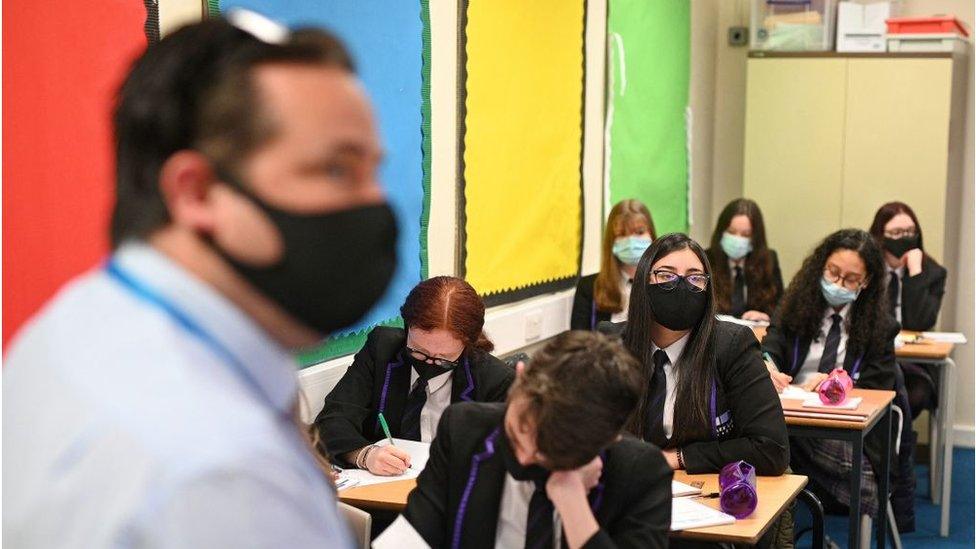
Students will only be assessed on what they have been taught either in a classroom setting or during home learning
An algorithm will not be used - statistical standardisation was used in 2020 and it proved controversial to say the least.
This year, students will only be assessed on what they have been taught, over the past two years, either in a classroom setting or during home learning.
They will not be assessed on what they would have achieved if exams had gone ahead, which is what teachers were asked to do in 2020.
Teachers can base their decisions on a number of different aspects, including coursework, previous class exams, questions provided by exam boards as a guide and other non-exam assessments.
The Northern Ireland exams board - the Council for the Curriculum Examinations and Assessment or CCEA for short - says it will review how schools award grades to ensure fairness and consistency.
Pupils in year 11 taking GCSE units or modules will not be awarded grades this summer.
The exception will be pupils taking GCSE maths who plan to study GCSE further maths in year 12 and GCSE Irish students who will move on to study GCSE Gaeilge.
Can students appeal?
Pupils will be able to appeal against their GCSE results if they think an "unreasonable academic judgement" was made by their school.
They can also appeal if they believe there was an administrative error or the school or college did not follow their procedure.
CCEA has published details of the process, external and a pupil will first have to appeal to the school if they think something has gone wrong in the working out of their grade.
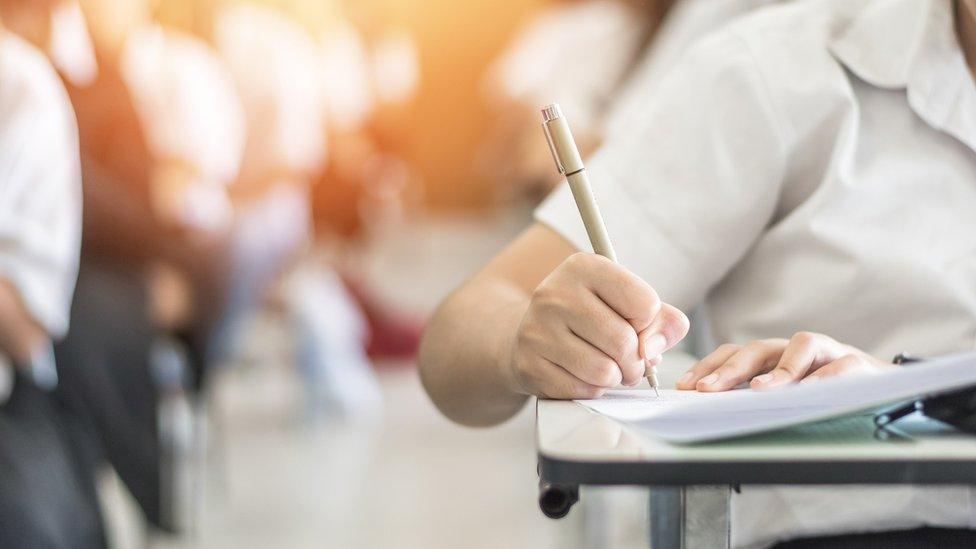
GCSE, AS and A-level exams are due to take place again in the 2021/22 school year
If pupils are still unhappy after that process, they can then appeal through their school to CCEA itself.
While CCEA will not re-mark a pupil's work, it will look at whether their grade was right based on the evidence the school used.
CCEA has said if it "finds that a grade is unreasonable, we will award a new grade that we consider best reflects the evidence we have seen".
CCEA will not charge fees for appeals in 2021.
What other results are coming out?
A-level, AS-level and some BTec students received their results on Tuesday.
More BTec grades will be announced on Thursday.
BTecs are qualifications based on work-based skills. They can be taken in areas such as business, healthcare and engineering.

How A-level grades were calculated in 2020 sparked widespread criticism and protests
They are mainly taken by learners over 16, although some schools offer them to 14 to 16-year-olds, normally in combination with other qualifications such as GCSEs.
Unlike GCSEs and A-levels, BTecs are formally assessed throughout the academic year, meaning there is more information on which to base final grades.
Students will receive teacher-assessed grades this year - no external assessments or algorithms will be used.
The exception to that is BTec students taking qualifications that can only be required through practical assessment, such as training to become an electrician.
In those instances, external assessments will still be used to check skills - they were adapted to allow for social distancing.
How are GCSEs graded?
The marks are letter-based and range from A*-G.
In summer 2019, the grading for all CCEA GCSE qualifications changed, with the addition of a C* grade.
As some pupils in Northern Ireland take some GCSEs through English exam boards, they will receive some results in number format.
What happened in 2020?
Summer exams were cancelled due to the pandemic, and pupils were told their grades would be predicted by their teachers and those marks would be externally moderated.
Then CCEA was asked to standardise results in case some teachers were too generous or too harsh.
After a last-minute change by the Department of Education, GCSE results were based solely on teachers' predictions.
The U-turn came after an uproar when more than a third of A-level results had been downgraded through standardisation.
Will exams go ahead next year?
GCSE, AS and A-level exams in Northern Ireland will take place again in the 2021/22 school year.
However pupils taking those qualifications through the CCEA exams board will sit "significantly fewer" exams in each subject.
AS grades given to pupils in 2021 will not count towards their A-level grade in 2022.
Prior to the pandemic, AS results made up 40% of a pupils overall A-level grade.
Related topics
- Published17 May 2021
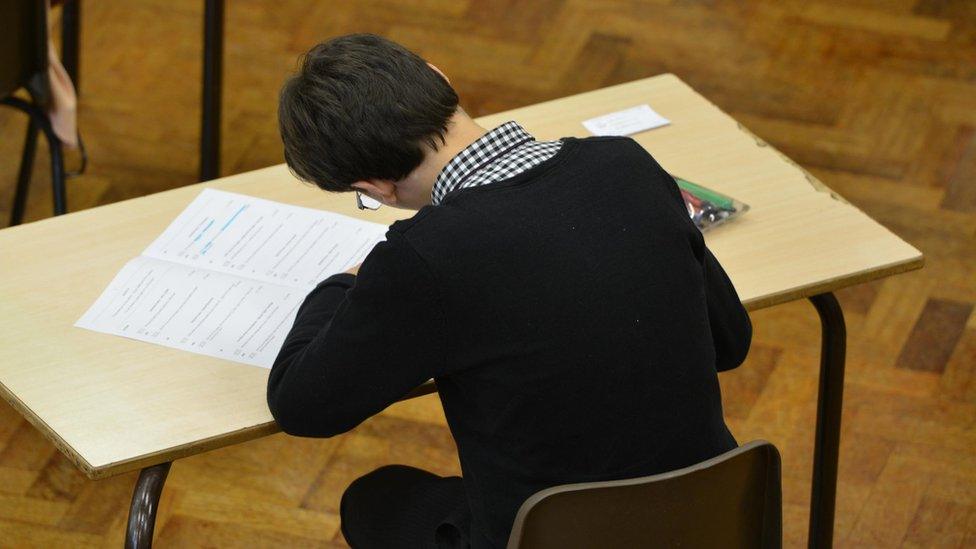
- Published10 August 2021
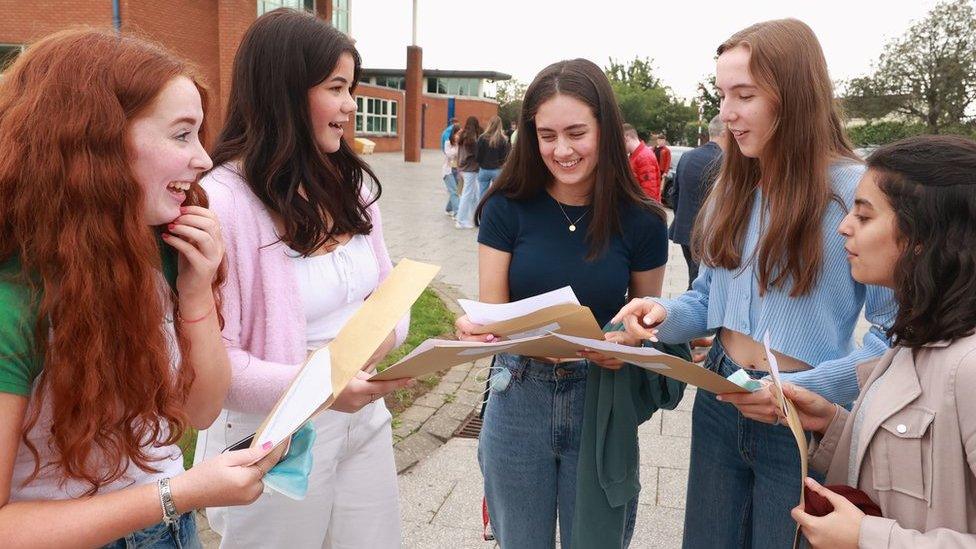
- Published2 February 2021
